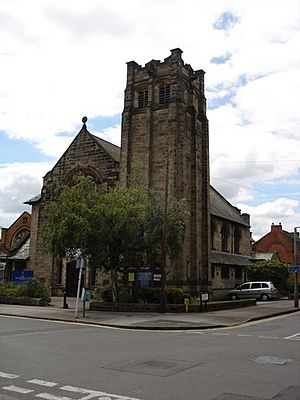Friary United Reformed Church, West Bridgford facts for kids
Quick facts for kids Friary United Reformed Church |
|
|---|---|

Friary United Reformed Church
|
|
| 52°56′03″N 1°08′02″W / 52.934261°N 1.133764°W | |
| OS grid reference | SK 58342 37779 |
| Location | West Bridgford, Nottingham |
| Country | England |
| Denomination | United Reformed |
| Previous denomination | Presbyterian |
| Architecture | |
| Architect(s) | Arthur Brewill and Basil Baily |
| Groundbreaking | 1898 |
| Completed | 1901 |
| Specifications | |
| Length | 60 feet (18 m) |
| Width | 40 feet (12 m) |
| Height | 26 feet (7.9 m) |
The Friary United Reformed Church was a special building located on Musters Road in West Bridgford, Nottingham, England. It was built a long time ago, between 1898 and 1901. This church was so important that it was given a special status called a Grade II listed building. This means it was protected because of its history and architecture. The church closed its doors in June 2022.
Contents
The Church's Story
How the Church Began
The people who formed this church first met at a place called Friar Lane Chapel. That chapel started way back in 1827. Later, in 1897, the group decided to move to West Bridgford. Other church members from places like Castle Gate Congregational Centre and Park Hill Congregational Church joined them.
Opening Day and First Events
The new church building was officially opened in September 1901. Soon after, the first baptism happened there. A girl named Doris Edith Whitemore was baptized. She was the first girl and only the second person to be baptized at the church. Doris later became a singer in the church choir.
Joining the United Reformed Church
Over the years, other churches joined with Friary Church. In 1970, the Queen's Walk Congregational Church became part of Friary Church. Then, in 1972, Friary Church officially joined the United Reformed Church.
The Church Organ
A Special Musical Instrument
The church had a very old and special musical instrument called a pipe organ. It was made by a company called Charles Lloyd and Co in 1885. You can find details about this organ in a special list called the National Pipe Organ Register.
Moving to a New Home
In the mid-1990s, this amazing organ was moved to a new home. It traveled all the way to Lusaka, Zambia, in Africa. There, it found a new place in the Cathedral of the Holy Cross.
 | Calvin Brent |
 | Walter T. Bailey |
 | Martha Cassell Thompson |
 | Alberta Jeannette Cassell |

